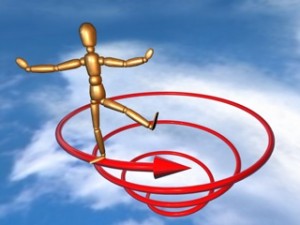Repeat and Discover
 I think too much.
I think too much.
Maybe it’s because I want to figure things out, crack the code, that sort of thing. That’s a useful way of working if the point is to crack the code, or figure things out. But if I actually want to use that knowledge, well … I need to repeat. Practice. Once I get an answer, I need to apply it again and again until it sticks.
Learning a language is fertile ground for this attack. There are thousands of words to learn, grammar, pronunciation, patterns, and so on. Thousands of questions and answers. Xuesheng means student? Great! Next one! How about Japanese? Gakusei? Got it!
This is all well and good, but as any language student knows, it’s not good enough if we actually want to use the language. We gotta practice. Immersion. Conversations.
This is refine and repeat. We know what to do, but that’s just the beginning. Repetition locks it in, helps it flow more easily, facilitates improvisation, makes it our own … all that stuff.
There’s another kind of practice: when a teacher shows you something, then you ask him how to do it and he advises you to “practise”.
But what do I practise? What I showed you. Relax.
How do I relax? Just practise.
When will I know if I’m doing it right? Practise.
But what –? Oh, just shut up and practise.
Unfortunately, this feels like practising blind. We’re uncomfortable with it because we don’t want to practise the wrong thing over and over. We have no map. No “metrics” as they say in business.
But we do have a goal, beyond one such as “relax”. It’s wu wei : non-doing. Mushin: no-mind. Effortlessness. To put it another way, we want to practise something until we get to the point where it becomes habit, natural, the thing we do when we don’t think. When we do a move “wrong”, it’s (generally) not bad or harmful, we’re just doing it the way we do it when we do it without thinking. Got that? The “wrong” way is habit, so we want the “right” way to be habit. We want to practise the new way until it becomes second nature.
But wu-wei is difficult. There’s still an action involved, the thing that we are doing naturally. Do I focus away from the action, focus on the action, or focus on nothing?
I think we all know the answer to that one. <sigh>
Amen brother!
I have found my best practice comes when I just quit beating on myself and just do it. A friend of mine ends her emails with the quote, “just do it” and I could not agree more.
I’d probably be a lot better off in my Tai Chi and LHBF practices if I just quit getting in my own way, relaxed a bit and just did it. Make the mistakes and keep going. Quit thinking it to death.
Last year I attended part of the Lok Hup week. I was never so tired in my life. Near the end, I was getting in my own way and was frustrated that I could not do or even remember what I was supposed to do. The instructor, in a fit of great wisdom I guess, said to the class “don’t be so hard on yourself. Some of you have never even done these moves before. Just let it come.” I’m sure my quote is not exactly accurate, but after that afternoon, I felt a lot better. I just kept going on, kept having fun. Once I got out of my own way, things went a lot smoother and every time I did it again and again and again, my moves changed. Not always for the better, but they did change. I was being allowed to grow and it felt good.
Today some of those same moves have become almost second nature and every once in a while I have to stop and take apart what I have learned. It isn’t that the movement changed, but I did and have to keep learning. It’s a great fun process that never stops.
Every once in a while, I get a feeling that the moves are just flowing. I don’t think about it, they just come in a very relaxed manner. I suppose that is wu wei.
I’m quite sure that I do not understand “non-doing” in its fullest sense, but I do feel that at least I have a small inkling of what is meant by the term.